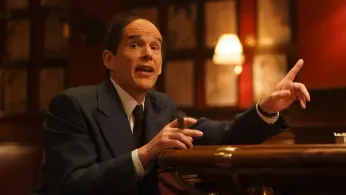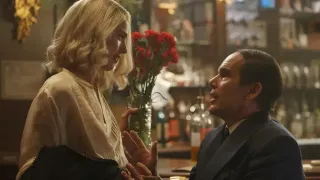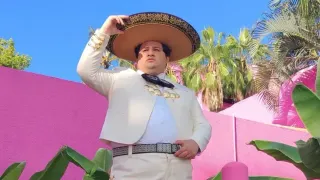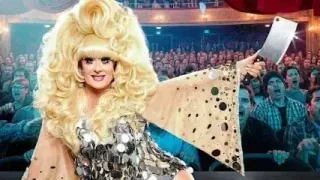
8 hours ago
Ethan Hawke’s ‘Blue Moon’ Dazzles with Queer Melancholy and Broadway Brilliance
READ TIME: 3 MIN.
Every so often, a film emerges that feels like a love letter to the hidden hearts of our queer past—a shimmering, blue-tinted postcard from the edge of Broadway’s footlights. Enter “Blue Moon,” the latest from director Richard Linklater, starring Ethan Hawke as the famously enigmatic lyricist Lorenz Hart, half of the Rodgers and Hart songwriting duo whose genius shaped American musical theatre. But while Rodgers’ star soared with Hammerstein, Hart’s legacy—queer, complicated, and heartbreakingly human—has often been consigned to the margins.
Ethan Hawke, never one to shy from a challenge, dives headfirst into Hart’s world, channeling a man whose lyrics vibrated with longing and whose life was a study in contrast: fame and isolation, wit and loneliness, coded desires and public restraint. “It’s kind of like a guy going in front of a firing squad,” Hawke confessed about embodying Hart’s relentless, anxious energy. “If he stops talking, they’re going to shoot” . There’s something achingly queer in that metaphor—of always performing, always deflecting, lest the world see too much.
Lorenz Hart’s story is, in many ways, the story of countless LGBTQ+ people whose creative brilliance was forced into subtext by a society that demanded silence. Hart’s lyrics—sharp, self-effacing, and brimming with coded yearning—spoke to generations of outsiders who recognized themselves in his sly turns of phrase and aching melodies. “We invest our hearts in worthless stocks and we know it,” Hawke, as Hart, declares in one of the film’s standout scenes—a line that lands with particular resonance for queer audiences who understand the bittersweet risk of loving in secret .
For Hawke, this was no ordinary role. Preparing for “Blue Moon” meant a full physical transformation (head shaved, posture altered) and months of seclusion to inhabit Hart’s restless mind. “I was locked in,” Hawke told reporters, recalling the intensity of Hart’s constant chatter, his desperate bid to fill the silence with song or wit . The performance is a tour de force—raw, jittery, and devastatingly honest.
What makes “Blue Moon” so vital—not just another biopic, but a queer cinematic event—is its refusal to sanitize or simplify Hart’s experience. Director Richard Linklater and Hawke, frequent collaborators, approach their subject with empathy and nuance, spotlighting the loneliness that lurked behind the curtain and the coded connections that sustained Hart in a world that would not let him love openly .
At the New York Film Festival, Hawke and co-star Andrew Scott (a queer icon in his own right) discussed the challenge of portraying a man whose plot, as Scott put it, “is somewhere else”—always scanning the room for acceptance, for a glance, for a moment of connection that might not come . The film’s pacing, deliberately anxious and fragmented, echoes the fractured way so many queer people have experienced public life: a series of snatched conversations, coded glances, and the ever-present tension between visibility and safety.
It’s no accident that “Blue Moon” feels so immediate, so alive with queer tension and longing. Hart’s Broadway was a world of double entendres and winking subtext, a coded language that LGBTQ+ audiences have always recognized as their own. Watching Hawke’s Hart navigate this world—brilliant, brittle, never quite at home—is a reminder of how much has changed, and how much remains heartbreakingly familiar.
“Blue Moon” is not just a showcase for Hawke’s formidable talent; it’s a reclamation of queer history, long relegated to the shadows. In bringing Hart’s story to the forefront, the film invites a new generation to reckon with the joy and pain of queer artistry—how it flourishes in the margins, how it endures against the odds.
For LGBTQ+ viewers, there is particular power in seeing a figure like Hart, so long reduced to a footnote in Broadway lore, restored to full complexity: flawed, fabulous, and inescapably queer. The film’s emotional resonance comes not just from its period detail or musical nostalgia, but from its insistence that queer lives and loves are worthy of center stage.
And in Hawke’s hands, Hart is more than a tragic genius—he’s a mirror for every queer creative who has ever poured their heart into their work, even when the world refused to see them. As Hart might have written, the heart is quicker than the eye—and in “Blue Moon,” that truth pulses through every frame .
In a cinematic landscape that too often settles for safe, sanitized versions of queer history, “Blue Moon” offers something braver: a messy, beautiful, deeply felt portrait of a man whose lyrics changed the world, even as he struggled to find his own place in it. For anyone who has ever loved in the shadows, Hawke’s Hart is a revelation—and a reminder that the greatest stories are the ones that finally, gloriously, step into the light.






